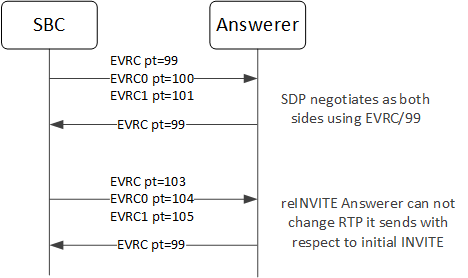Asymmetric Dynamic Payload Types Enablement
Transcoding Support for Asymmetric Dynamic Payload Types supports calls with asymmetric payload types such that a codec offered with one payload type and answered with another payload type is acceptable to the Oracle® Enterprise Session Border Controller. This behavior requires transcoding resources.
The Oracle® Enterprise Session Border Controller's default behavior when an endpoint answers an SDP offer with a different payload type than offered is to use what the endpoint replied with as if that were what the Oracle® Enterprise Session Border Controller included in its SDP offer. The Oracle® Enterprise Session Border Controller would then expect to receive the same payload type that the endpoint offered. This is referred to as symmetric payload type mapping, whereby the payload type number is the same for both media flows.
The
Oracle® Enterprise Session Border Controller needs to support the asymmetric case when codecs with dynamic payload types are used. For example, a call may be set up with the dynamic codec using one payload type value, and a reINVITE may use a different payload type value for the same codec. Because of the range of remote UE equipment's behavior in a reINVITE case, the
Oracle® Enterprise Session Border Controller can support this via its Asymmetric Dynamic Payload Type feature. That is, some devices do not necessarily use the currently negotiated payload type, they may use previously negotiated payload types. As such devices interact with the default
Oracle® Enterprise Session Border Controller behavior, one-way audio may result.

For transcoded calls, enabling this feature places no additional load on the system. But for calls that are not transcoded, this feature consumes transcoding resources.



